What are the concerns regarding giving water to a baby?
Let’s go through when and why water to a baby should be limited or even avoided.
Mom’s Question:
My three month old wants to suck on a bottle about every hour. I know he is not hungry, so I was wondering if he can have a small amount of water? Can it be harmful in any way to give water to a baby?
Thanks,
Amanda
All About Water to a Baby and Water Intoxication
When Can An Infant Drink Water?
When a new baby comes home, grandparents and other family members may offer new parents advice based on their own experiences raising children. A common recommendation is to give the baby water to drink. However, there are several reasons why young infants should not drink water.
They get enough water through from the breastmilk or formula
First, infants receive a significant amount of water from either breastmilk or formula. Breastmilk consists of 87 percent water along with fats, protein, lactose, and other nutrients.
If parents choose to give their baby infant formula, most are manufactured in a way that mimics the composition of breastmilk. The first ingredient of a ready-to-feed formula is water, and powdered versions must be combined with water.
Most infants feed every two to four hours, so they get plenty of water during breast or formula feedings.
They need the breastmilk or formula for growth and development
Both the World Health Organization and the American Academy of Pediatrics recommend that infants exclusively breastfeed until the age of six months. The reason for this is to ensure that infants receive sufficient nutrition for optimal growth and development. If not breastfeeding, an infant formula is recommended instead.
After six months old, water may be offered to infants as a supplemental beverage. Four to eight ounces per day are adequate up until the first birthday. It is important not to replace formula or breastmilk feedings with water which could result in weight loss and poor growth.
Newborn kidneys are immature – water intoxication is a real risk
Lastly, newborn kidneys are immature. They cannot not properly balance the body’s electrolytes until at least six months old. Water is just that… water. It lacks the sodium, potassium, and chloride that naturally occurs in breastmilk, or that is added to infant formulas.
When water is given prior to six months, or excessively in older infants, the amount of sodium circulating in the bloodstream decreases. A low blood sodium level, or hyponatremia, and can cause irritability, lethargy, and seizures. This phenomenon is called infant water intoxication.
Signs of water intoxication in babies are:
- changes in mental status, i.e., unusual irritability or drowsiness
- low body temperature, usually 97 F (36.1 C) or less
- facial swelling or puffiness
- seizures
It may also develop when powdered infant formula is prepared improperly. For this reason, the package instructions should be closely followed.
What Else Should Parents Know About Giving Infants Water?
Consider water safety
Once an infant is old enough to drink water, there are a few things to consider. Depending on where you live, your home may have municipal, well, or another water source. Many families prefer bottled water for drinking, but use what comes out of their faucets for food preparation. In most municipalities in the US and many other countries, water is treated to ensure that it is safe for consumption. However, this may, of course not be true where you live and water quality and safety is a huge problem in many parts of the world.
Occasionally, something happens that makes the water supply in an area temporarily unsafe – or it is generally unsafe. For example, when there is a “water main break,” families my be advised to temporarily boil water to prevent potential water-born illnesses Boiling water for the recommended time period protects against bacterial and parasitic infections, but is not recommended when there are other contaminants such as lead.
Lead contamination needs to be considered
Lead contamination occurs when water flows through lead-based pipes into homes, daycare centers, and other buildings. It can be present both in municipal and well water. Testing is the only sure way to detect its presence.
According to the Environmental Protection Agency, any lead level that is higher than 15ppb should not be consumed. Infants are particularly at risk when they ingest lead because it has detrimental effects on the brain and nervous system. Prolonged exposure to high lead levels can result in developmental delays and permanent learning disabilities.
If you live in an older home or are concerned that your local water is supplied via lead pipes, you should test the water for lead before giving it to your baby.
Added fluoride in the water
The water treatment centers of many municipalities add fluoride to help reduce tooth decay in their communities. A level of 0.7mg of fluoride per liter of water is recommended by the American Dental Association, American Academy of Pediatrics, and other authorities.
Fluoride protects teeth by maintaining the mineral content of the enamel, and by preventing oral bacteria from sticking to the teeth. An infant’s first tooth erupts between six to 12 months old, and the remaining teeth appear during the subsequent 12-18 months. Since primary teeth will be present until the early grade school years, protecting them is important.
Fluoride is recommended for infants aged six months and older. It is unnecessary prior to this age, and fluoridated “nursery water” products on the market should not be used to prepare infant formula. When local water sources are without fluoride, your pediatrician may prescribe a fluoride vitamin supplement at the six month old well care visit.
The Answer To The Question
No, it is not safe to give your three month old baby water for all of the reasons discussed. To soothe your infant between feedings, a pacifier, rocking, or swaddling may be helpful.
Hope this helps and good luck!
Find more tips and discussions on bottle-feeding here.
Paula
Research references
- Review of Infant Feeding: Key Features of Breast Milk and Infant Formula
- How to Safely Prepare Formula with Water
- WHO: Infant and young child feeding
- A meta-analysis of public compliance to boil water advisories
- A Case of Hyponatremia-induced Seizures in an Infant Secondary to Water Intoxication from the Use of Almond Milk
- Lead in Tap Water & Household Plumbing: Parent FAQs
- An Update on Childhood Lead Poisoning
- Water Fluoridation
- Pediatric oral health: Fluoride use recommendations
- Fluoride and Water

Paula Dennholt founded Easy Baby Life in 2006 and has been a passionate parenting and pregnancy writer since then. Her parenting approach and writing are based on studies in cognitive-behavioral models and therapy for children and her experience as a mother and stepmother. Life as a parent has convinced her of how crucial it is to put relationships before rules. She strongly believes in positive parenting and a science-based approach.
Paula cooperates with a team of pediatricians who assist in reviewing and writing articles.

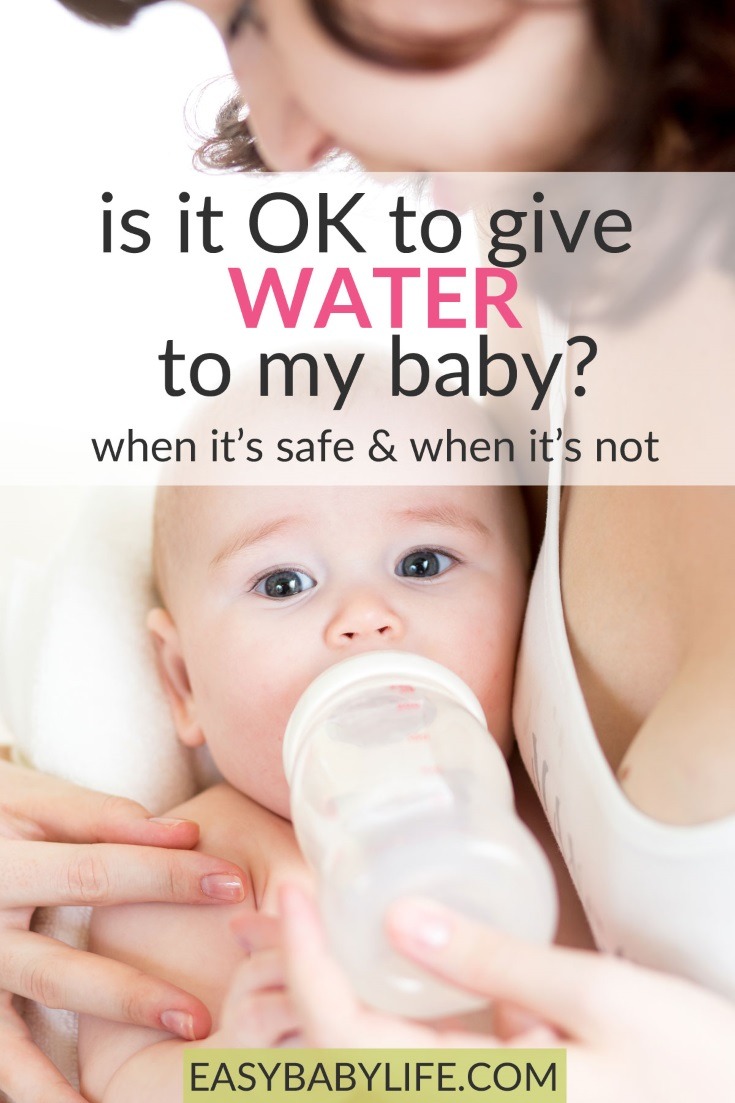
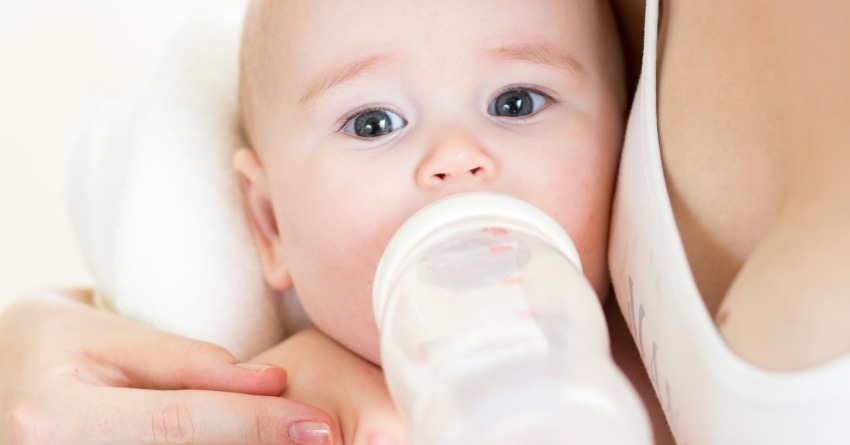
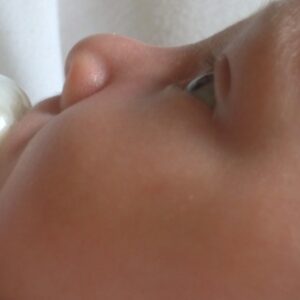


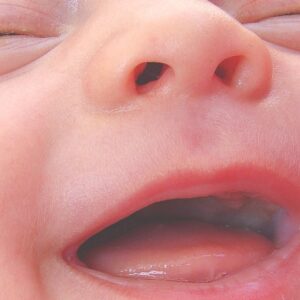

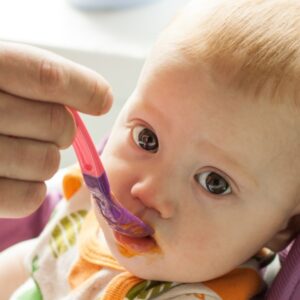
Paula,
Is it possible to give a 9 week old baby too
much water… I started with just a lil an then realized he really likes
water and he drinks like 5 or 6 ounces a day… There are no signs of any
harm but I just wanted to ask if that was too much water.. Side note: I
live in Arizona and I’m always scared of dehydration, which is why I
started water.
Hi,
Well, at 9 weeks, your baby should be drinking breastmilk or formula. These will help his thirst just as much as water and of course, help him grow too. He is growing very quickly right now, so his “water cravings” can actually by hunger… I would switch to breast milk or formula as much as possible!
Good luck and congrats on your baby!